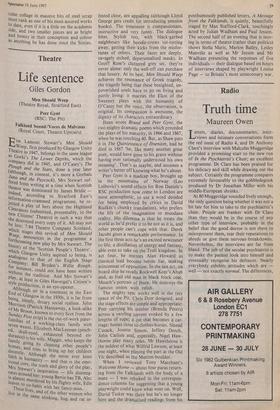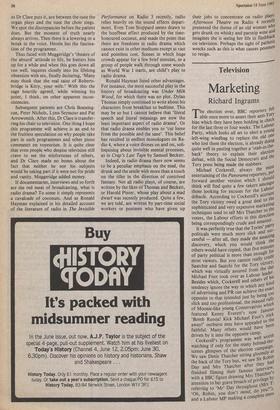Radio
Truth time
Maureen Owen
Letters, diaries, documentaries, inter- views and intimate conversations form the red meat of Radio 4, and Dr Anthony Clare's interview with Malcolm Muggeridge provided a promising start to the new run of In the Psychiatrist's Chair; an excellent programme. Dr Clare has been praised for his delicacy and skill while drawing out the subject. Certainly the programme compares extremely favourably to the gobbledegook produced by Dr Jonathan Miller with his middle-European shrinks.
At 80 Muggeridge sounded lively enough, the only question being whether it was not a bit late for him to take to the psychiatrist's chair. People are franker with Dr Clare than they would be in the course of any other type of interview, probably in the belief that the good doctor is not there to misrepresent them, tear their reputations to shreds or give them nervous, breakdowns. Nevertheless, the interviews are far from bland. The job of the secular psychiatrist is to make the patient look into himself and eventually recognise his defences. Nearly everybody exhibits attitudes which are well — not exactly normal. The differences,
as Dr Clare puts it, are between the tune the
organ plays and the tune the choir sings. We spot the discrepancies before the patient does. But the moment of truth nearly always arrives. Then there is a lowering or a break in the voice. Herein lies the fascina- tion of the programme. Thus faced with Muggeridge's 'theatre of the absurd' attitude to life, he butters him up for a while and when this goes down all too well, inquires closely into his lifelong obsession with sex, finally declaring, 'Many may think that the real saint of Roberts- bridge is Kitty, your wife.' With this the sage heartily agreed, while winning his point, I think, on other apparent incon- sistencies.
Subsequent patients are Chris Bonning- ton, Peter Nichols, Lynn Seymour and Pat
Arrowsmith. After this, Dr Clare is transfer-
ring his chair to television. One thing I hope this programme will achieve is an end to
the fruitless speculation on why people take
part in such programmes and other pious comments on voyeurism. It is quite clear
that even people who despise television still crave to see the misfortunes of others, and Dr Clare made no bones about the
fact that neither he nor his subjects would be taking part if it were not for pride and vanity. Muggeridge added money. If documentaries, interviews and so forth are the red meat of broadcasting, what is radio drama? To some it simply represents a cavalcade of coconuts. And as Ronald Hayman explained in his detailed account of the literature of radio in The Invisible Performance on Radio 3 recently, radio relies heavily on the sound effects depart- ment. Even Tom Stoppard seems drawn to the hoofbeat effect produced by the time- honoured coconut, and made the point that there are freedoms in radio drama which cannot exist in other mediums except at vast and pointless cost. Scenes in which huge crowds appear for a few brief minutes, or a group of people walk through some woods as World War I starts, are child's play to radio drama. Ronald Hayman listed other advantages. For instance, the most successful play in the history of broadcasting was Under Milk Wood, for which there was no plot. Dylan Thomas simply continued to write about his characters from breakfast to bedtime. This may be so but I cannot believe that 'literal speech and literal meanings are now the least important aspect of radio drama'. Or that radio drama enables you to 'cut loose from the possible and the sane'. This belief has resulted in endless monologues on Ra- dio 4, where a voice drones on and on, soli- loquising about invisible mental processes, as in Crap's Last Tape by Samuel Beckett. Indeed, in radio drama there now seems to be a peculiar emphasis on the mad, the drunk and the senile with more than a touch on the tiller in the direction of contrived fantasy. Not all radio plays, of course, are written by the likes of Thomas and Beckett, or Harold Pinter, whose play about a mad dwarf was recently produced. Quite a few, we are told, are written by part-time social workers or postmen who have given up their jobs to concentrate on radio plays' Afternoon Theatre on Radio 4 recentlY presented the theme of an old woman who gets drunk on whisky and parsnip wine and imagines she is seeing her life in flashback on television. Perhaps the sight of pathetic wrecks such as this is what causes postmen to resign.







































 Previous page
Previous page